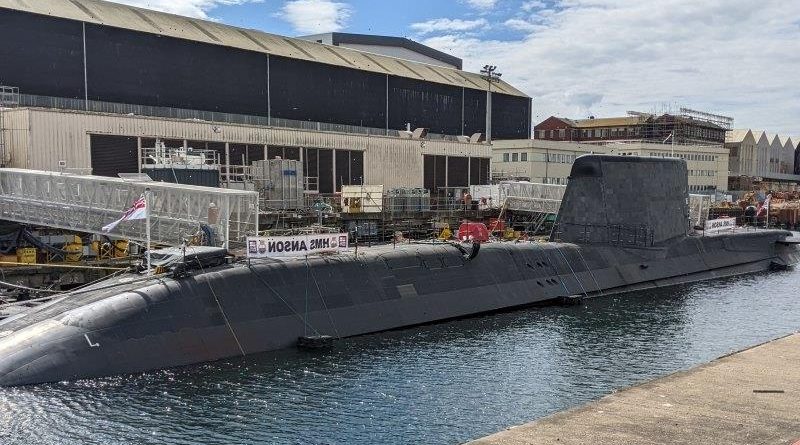The sub-plot to our AUKUS pact: We may need UK rather than US submarines
Last week, Defence Minister Richard Marles returned from a successful visit to the United Kingdom. At the top of his agenda was a series of meetings, including with outgoing prime minister Boris Johnson and Defence Secretary Ben Wallace, to discuss the next steps in the AUKUS security pact; in particular, the British bid to supply the submarines which, powered by American nuclear-propulsion technology, are AUKUS’s first joint project.
There is much more to AUKUS than the submarine acquisition. It is a long-range commitment to the joint development of a variety of complex technologies for defence purposes: hypersonics, quantum computing, artificial intelligence and other advanced capabilities. However, the submarine program – Pillar One, in the jargon – is the most tangible and the soonest to begin.
A real option for Australia: Boris Johnson, in one of his final duties as Britain’s prime minister, attends the commissioning of HMS Anson, Britain’s newest Astute-class, nuclear-powered submarine in Barrow.Credit:Latika Bourke
The most important question looming over AUKUS in the near term is the choice of submarine. In the debate so far, this has been posed as binary: whether the preferred vessel should be British or American. Specifically, whether it should be the next generation of the UK’s Astute-class submarine, or the US Virginia or Los Angeles-class.
At their press conference at Barrow in north-west England, where Britain’s nuclear submarines are built, Marles, Johnson and Wallace avoided the issue by characterising it as a tripartite build, with significant elements from each country. While this is true up to a point – and takes account of the Australian priority for substantial construction domestically – the ultimate choice will be between a British or American design.
This is a decision which the Albanese government has committed to making in the first half of next year. The evaluation process is well under way. This is a more complex decision than that faced by the Turnbull government when it chose the design of a next-generation diesel-powered submarine. At that time, the much-superior US nuclear propulsion technology was not available to Australia; the decision was a straightforward choice between French, German and Japanese tenders. If the tender for the AUKUS submarine is awarded to Britain, US technology will have to be integrated into a British design.
That added layer of complexity is one of several reasons why many prefer an American sub: its promoters claim that it could be purchased, effectively, “off the shelf”. While that is way too simplistic to describe the development and acquisition of any complex weapons platform, superficially the American option does appear simpler. Added to that are the crucial issues of speed of delivery and, of course, cost – on both of which the American option is claimed to be superior.
At the Indian Ocean Defence and Security Conference in Perth a fortnight ago, there was a near-to-unanimous expectation that the American build would be chosen. That was the view strongly expressed by the former defence minister and Australia’s current Defence Industry Advocate, David Johnson. It is also clearly former defence minister Peter Dutton’s view, as evident from his claim during the election campaign that he had secured the agreement of the Americans to supply two submarines before 2030.
So far, Marles has been more careful, not expressing a public preference for one design over the other. This is absolutely the right approach; to do otherwise would pre-empt the evaluation process.
Concerningly, however, at the very time Marles was visiting Barrow, one of the most senior figures in the US Navy’s nuclear submarine program, Rear Admiral Scott Pappano, gave an interview in which he cast doubt on America’s readiness or even capacity to incorporate the supply of submarines to Australia into its production schedule. “If we are going to add additional submarine construction to our industrial base, that would be detrimental to us right now,” Pappano was quoted as saying. This comes at a time when the US Navy is planning significant increases its fleet size – including its submarine capability – to meet the China challenge. As Johnson and Wallace no doubt told Marles, there is no hesitancy on the part of the British.
The UK’s commitment to AUKUS is strong. The new Prime Minister, Liz Truss, is every bit as enthusiastic for AUKUS as was Johnson. Wallace has been reappointed as Defence Secretary. If, as many expect, he leaves the government next year to become the secretary-general of NATO, his likely successor in the portfolio is the new Security Minister Tom Tugendhat – a strong China hawk and AUKUS enthusiast. The Truss cabinet – indeed virtually the entire Conservative Party – share that sentiment.
Australia’s Deputy Prime Minister, Richard Marles, with then-British Prime Minister Boris Johnson in Barrow for the commissioning of Astute-class submarine.Credit:Official British government photographer.
We can also be confident that a future UK Labour government will take the same view. Although UK Labour was initially sceptical of AUKUS, its bipartisan support has since been clarified. At the Labour Party conference last year, which took place shortly after AUKUS had been announced, I sought and received firm assurances from both the shadow defence secretary and the then shadow foreign secretary that a future Labour government would fully support AUKUS – a position since reinforced by Labour leader Keir Starmer and the shadow cabinet.
The UK’s eagerness to win the submarine contract is palpable. It conforms with one of the key priorities set out in last year’s Integrated Review of Britain’s geostrategic objectives, the “tilt to the Indo-Pacific”. It also reflects an electorally powerful domestic priority which does not feature in American thinking – the rehabilitation of the industrial manufacturing base in the north of England. As a very competitive UK election looms in 2024, the Australian submarine contract would be a huge political trophy.
I don’t doubt the US commitment to AUKUS is as strong as Britain’s. Inevitably, though, Australia has less weight in its relationship with the US than it does in that with the UK. Put simply, we are, as a customer, in a weaker position. And the domestic political imperatives in the UK are entirely absent from America’s priorities. It is inconceivable that anyone of importance in the British system would think as Admiral Pappano does.
The US Virginia-class, nuclear-powered submarine.
Ultimately, a defence contract of this magnitude will be a decision based on capability, cost and the capacity to deliver soonest. The received wisdom in Defence is that all of those factors favour the choice of an American design. Yet – as the short life of the French diesel submarine project demonstrated – things can change fast in a few short years. For a project whose delivery times are measured not in years but decades, another important consideration is to ensure Australia is in the strongest position it can be when it comes to the delivery phase.
The Opinion newsletter is a weekly wrap of views that will challenge, champion and inform your own. Sign up here.
Most Viewed in National
From our partners
Source: Read Full Article





